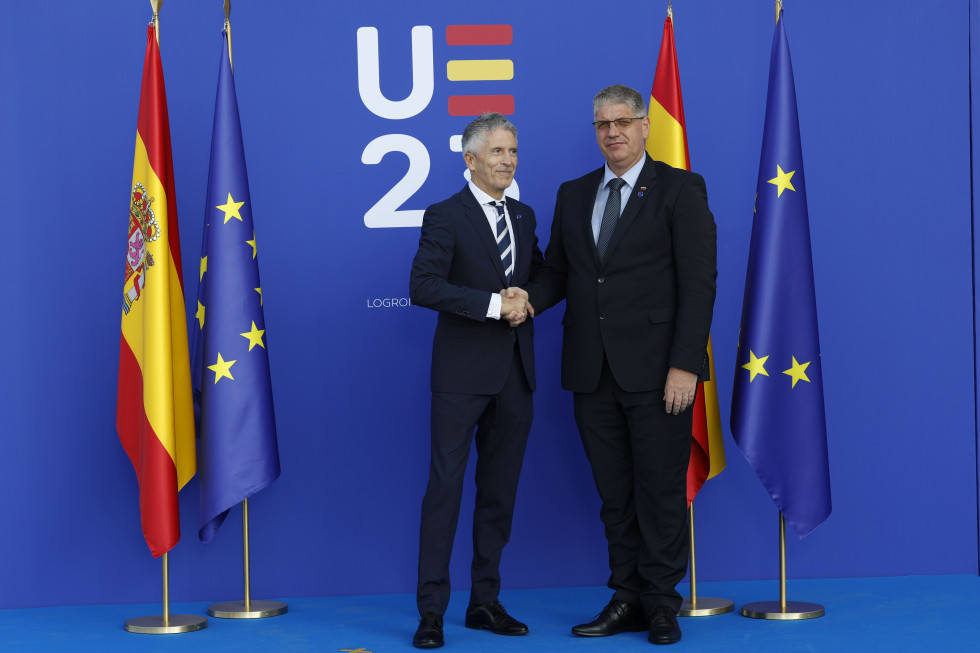The fight against organised crime requires a coordinated and targeted response
Ministers discussed access to data in order to fight crime in the digital age, the fight against organised crime with a focus on drug trafficking, and cooperation with Latin America. They also discussed the situation in Ukraine in terms of internal security, and migration.
There was unanimous agreement that organised crime persists as a major threat, both at European and global level, and that a coordinated and targeted response is crucial. The ministers supported cooperation with Latin America on the fight against drug trafficking, but underlined the need to continue to work intensively with the Western Balkans region, North Africa, as well as the United States and the United Kingdom, because this is a global challenge that requires a global response. Minister Poklukar pointed out that Slovenia supported the Spanish Presidency’s effort to deepen engagement on cooperation with the Latin America Committee on Internal Security. The minister said that “in the fight against organised crime, we need to strengthen cooperation with regions that have a significant impact on drug trafficking or may even be countries of origin” and highlighted the Western Balkans as a priority transit region affecting the situation in Slovenia. The ministers agreed that timely exchange of operational information is necessary and that it needs to be followed by a proper analysis and use of analysis outcomes in the fight against organised crime. They expect the European Police Office (Europol) to analyse the needs of the EU Serious and Organised Crime Threat Assessment (SOCTA) as soon as possible so that more effective objectives can be outlined. The key message from the ministers was that we need effective tools, both technological and legislative. It is important that we are committed to the rule of law and human rights, as this puts us above criminal groups. The ministers agreed that in order to effectively investigate these crimes, we need to act on the economic flow that feeds crime and invest all available resources and knowledge, and cooperate while using uniform methodologies.
The advance of digital technologies and services is also reflected in the way crime operates, with digital services increasingly being used to commit crimes. For this reason, the Spanish Presidency added on the agenda a debate on the adoption of European legislation establishing a new system for retention of metadata on electronic communications. This would allow competent authorities to have access to useful data while respecting fundamental human rights and providing appropriate safeguards. The ministers agreed that the issue of access to data for police investigation purposes is important and that this is the main challenge for effective law enforcement. Metadata is an important source of information, in particular for investigating cyber crime and child sexual abuse. The ministers also supported efforts to strengthen cooperation with industry, in particular with non-traditional communications providers.
The measures taken by the EU to support Ukraine against Russian aggression were also presented by the Spanish Presidency at the meeting. In this context, the ministers discussed the impact of the war on EU's internal security. The Presidency has already launched activities to further extend the regulation on temporary protection of displaced persons. The European Commission is preparing a new legislative proposal to allow such an extension until 2027. Slovenia has not yet seen any direct impact of the war on crime rates in Slovenia, but we are constantly monitoring the situation in order to react promptly to possible changes. The Commissioner pointed out that the question is not if, but when and how illicit arms trafficking from Ukraine is going to grow.
The afternoon session focused on migration, in particular the external dimension of migration. “We all share the belief that the external dimension of migration, i.e. partnerships with third countries, can help prevent crises” said Minister Poklukar. “The approach we have taken in our cooperation with Tunisia is a step in the right direction, as agreements with third countries should be more comprehensive and cover broader aspects than the exclusive field of migration. This is why we expect the European Commission to expand this type of cooperation with other countries, such as Morocco and Egypt”. The Minister underlined the need to intensify work on the prevention of smuggling and to align Western Balkan’s visa policy as much as possible with that of the EU. The ministers agreed that prevention is crucial in managing migration. A crisis can be prevented, but we obviously need a long-term vision of cooperation with countries of origin. The ministers also discussed the crisis management regulation, which is an important segment of the Pact on Migration and Asylum. It balances responsibility and solidarity in situations of crisis, including the instrumentalization of migrants, and in situations of force majeure. “It is therefore all the more important to have a clear definition of these two concepts,” said Minister Poklukar. The ministers agreed on the need to remove as many ambiguities and concerns as possible between member states regarding the practical functioning of the regulation before starting negotiations with the European Parliament, and strongly backed negotiations. The Spanish Presidency undertook to work intensively on the Pact. It expressed its wish to conclude the negotiations with the European Parliament by the end of the year.

Slovenian and Spanish Interior Minister Boštjan Poklukar and Fernando Grande Marlaska Gomez | Author European Union

